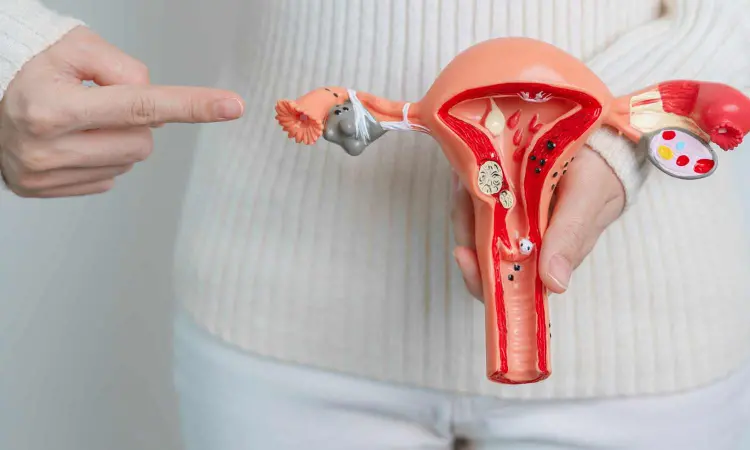- Home
- Medical news & Guidelines
- Anesthesiology
- Cardiology and CTVS
- Critical Care
- Dentistry
- Dermatology
- Diabetes and Endocrinology
- ENT
- Gastroenterology
- Medicine
- Nephrology
- Neurology
- Obstretics-Gynaecology
- Oncology
- Ophthalmology
- Orthopaedics
- Pediatrics-Neonatology
- Psychiatry
- Pulmonology
- Radiology
- Surgery
- Urology
- Laboratory Medicine
- Diet
- Nursing
- Paramedical
- Physiotherapy
- Health news
- Fact Check
- Bone Health Fact Check
- Brain Health Fact Check
- Cancer Related Fact Check
- Child Care Fact Check
- Dental and oral health fact check
- Diabetes and metabolic health fact check
- Diet and Nutrition Fact Check
- Eye and ENT Care Fact Check
- Fitness fact check
- Gut health fact check
- Heart health fact check
- Kidney health fact check
- Medical education fact check
- Men's health fact check
- Respiratory fact check
- Skin and hair care fact check
- Vaccine and Immunization fact check
- Women's health fact check
- AYUSH
- State News
- Andaman and Nicobar Islands
- Andhra Pradesh
- Arunachal Pradesh
- Assam
- Bihar
- Chandigarh
- Chattisgarh
- Dadra and Nagar Haveli
- Daman and Diu
- Delhi
- Goa
- Gujarat
- Haryana
- Himachal Pradesh
- Jammu & Kashmir
- Jharkhand
- Karnataka
- Kerala
- Ladakh
- Lakshadweep
- Madhya Pradesh
- Maharashtra
- Manipur
- Meghalaya
- Mizoram
- Nagaland
- Odisha
- Puducherry
- Punjab
- Rajasthan
- Sikkim
- Tamil Nadu
- Telangana
- Tripura
- Uttar Pradesh
- Uttrakhand
- West Bengal
- Medical Education
- Industry
Diabetes Treatment Tied to Lower Uterine Fibroid Incidence in Midlife Women, Study Finds

USA: A recent study from the Study of Women's Health Across the Nation (SWAN) has shed light on the relationship between diabetes, insulin resistance, and the prevalence of uterine fibroids in midlife women.
The study revealed that the impact of diabetes and certain biomarkers on fibroids can differ based on menopausal status. Specifically, they found that the risk of fibroids may rise with insulin resistance but decrease with effective diabetes treatment. The findings were published online in The Journal of Clinical Endocrinology & Metabolism.
"Individuals with diabetes experienced a 28% lower occurrence of uterine fibroids, particularly among those taking metformin," the researchers reported. "Our findings provide preliminary evidence suggesting a protective relationship between diabetes and the risk of developing new fibroids."
Uterine fibroids, non-cancerous growths in the uterus, are common among women, particularly during their reproductive years. However, their diagnosis can have profound implications for overall health, especially as women transition into menopause. Susanna D Mitro, Division of Research, Kaiser Permanente Northern California, Pleasanton, CA, USA, and colleagues sought to prospectively investigate the associations between glucose levels, insulin, sex hormone-binding globulin (SHBG), and diabetes with the incidence of fibroid diagnoses during midlife.
For this purpose, participants in the SWAN cohort (n = 2,570) reported fibroid diagnoses at enrollment (1996-1997) and during 13 follow-up visits (1996-2013). At each visit, we measured glucose, insulin, and sex hormone-binding globulin (SHBG) in fasting blood samples and calculated homeostatic model assessment for insulin resistance (HOMA-IR).
Diabetes was classified based on glucose levels, self-reported diabetes, or the use of diabetes medications. Discrete-time survival models were employed to estimate hazard ratios (HR) for the associations between time-varying biomarkers, diabetes, and the occurrence of new fibroid diagnoses, adjusting for demographic factors and healthcare utilization. We also assessed how these associations were influenced by menopausal status.
The study led to the following findings:
- At baseline, 2.7% of participants (n = 70) used diabetes medication.
- Time-varying glucose, insulin, HOMA-IR, and SHBG were not associated with fibroid diagnosis.
- Diabetes was associated with a 28% lower incidence of fibroid diagnosis (adjusted HR 0.72), driven by participants using metformin (adjusted HR 0.49), though precision was limited.
- After stratification by menopausal status, higher HOMA-IR and insulin were associated with a greater incidence of fibroid diagnosis during premenopause but not perimenopause, while the inverse association between diabetes and fibroids was strongest during perimenopause.
"The findings revealed that diabetes is linked to a reduced incidence of uterine fibroids in midlife women undergoing diabetes treatment, particularly with metformin. Additionally, the relationship between diabetes and the risk of uterine fibroids may differ depending on menopausal status," the researchers reported.
Reference:
Mitro, S. D., Waetjen, L. E., Lee, C., Wise, L. A., Zaritsky, E., Harlow, S. D., El Khoudary, S. R., Santoro, N., Solomon, D. H., Thurston, R. C., & Hedderson, M. M. Diabetes and Uterine Fibroid Diagnosis in Midlife: Study of Women's Health Across the Nation (SWAN). The Journal of Clinical Endocrinology & Metabolism. https://doi.org/10.1210/clinem/dgae625
Dr Kamal Kant Kohli-MBBS, DTCD- a chest specialist with more than 30 years of practice and a flair for writing clinical articles, Dr Kamal Kant Kohli joined Medical Dialogues as a Chief Editor of Medical News. Besides writing articles, as an editor, he proofreads and verifies all the medical content published on Medical Dialogues including those coming from journals, studies,medical conferences,guidelines etc. Email: drkohli@medicaldialogues.in. Contact no. 011-43720751


